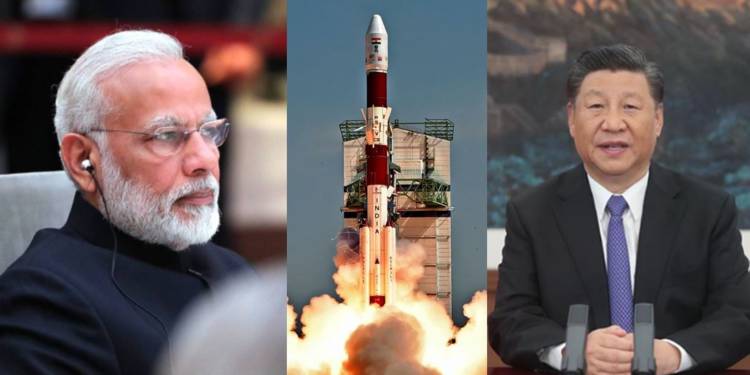As India and China compete for greater influence in the resource-rich Middle East, the rivalry between the two Asian giants is now entering the Space sector. For natural reasons, India and China want to expand their goodwill in the Middle East.
The Middle East countries themselves have certain goals to achieve- one of them being- diversifying their single-sector economies dominated by hydrocarbons that are vulnerable to sudden shocks.
The Gulf has understood the perils of single-sector dependence and therefore wants to enter new arenas. Countries like the UAE and Oman have led attempts to enter the Space technology sector. In 2014, the UAE established the UAE Space Agency. The UAE also initiated the formation of the Arab Space Coordination Group- an offshoot of the UAE Space Agency. The organisation includes Arab allies like the United Arab Emirates, Jordan, Bahrain, Algeria, Saudi Arabia, Sudan, Lebanon, Kuwait, Morocco and Egypt.
Both India and China have now understood that whoever wins the Space race in West Asia will also enjoy greater goodwill in the region.
The Space race started in September 2015 when the UAE Space evinced interest in cooperation with the Indian Space Research Organisation (ISRO).
A delegation led by Khalifa Al Rumaithi, then Chairman of the UAE Space Agency and Mohammed Nasser Al Ahbabi learnt about the Indian Space sector and several programmes that ISRO has led in the Space exploration sector.
The UAE showed itself got drawn towards ISRO because of two primary reasons- firstly, the emergence of ISRO as a leading Space agency and secondly because of the historically strong ties between the two countries.
China soon entered the Space race in December 2015, when the UAE and China signed an agreement for collaboration in space exploration and study and development of Space science.
The UAE is the biggest player in the Middle East when it comes to Space exploration. India itself has been making all attempts to help the UAE Space Agency become a formidable entity. In fact, in late 2017, a joint working group of the ISRO and the UAE Space Agency identified key areas where the two organisations will cooperate closely that includes UAE’s Mars mission, remote sensing applications and satellite platforms.
ISRO Chairman K. Sivan is himself quite appreciative of the UAE’s ambitious Space mission. The ISRO also played a key role in UAE’s first spacecraft “Hope Probe” launch. “Hope Probe” is also the first-ever Arab Space Mission to probe Mars planet and India has taken a lead by playing a central role.
The ISRO had also launched the first UAE nanosatellite Nayif-1 into Space from the Satish Dhawan Space Centre in Sriharikota, India in February 2017, whereas the China National Space Administration (CNSA) hasn’t been able to reach similar levels of cooperation with the UAE Space Agency.
As West Asia becomes more and more interested in space technology, other countries in the region like Saudi Arabia, Jordan, Oman and Israel are becoming battlegrounds for Space race between India and China.
As far as Saudi Arabia is concerned, India has been trying to lure Saudi Arabia into bilateral cooperation in the Space sector. Last year, the Indian Ambassador to Saudi Arabia, Dr. Ausaf Sayeed had met Prince Sultan bin Salman, Chairman of the Saudi Space Commission and proposed extending bilateral cooperation in the key sector.
Prince Sultan had himself said that since the establishment of the Saudi Space Agency, the kingdom had been focussing on bilateral cooperation with countries like India that boast of advanced Space exploration technology. China too has been trying to woo Saudi Arabia, and in 2018, it had even launched two Earth Observation Satellites for the Kingdom.
Another key country in the region, Oman has been showing a lot of interest in collaborating with ISRO. Impressed with India’s space programme, Oman had sent a delegation to ISRO’s technical facilities in the year 2011. Moreover, during Prime Minister Modi’s 2018 visit to Muscat, the two countries sealed a Memorandum of Understanding (MoU) in the peaceful uses of the outer Space. It is expected that India will assist the key geostrategic country in developing capabilities in foundational areas such as human resource development and training.
China, on the other hand, doesn’t have much to show in Oman either, though it has managed to get Jordan to collaborate on certain areas in Space exploration. India must also gear up to expand its influence in Jordan along with other countries of the Arab world.
Finally, in the case of Israel, India doesn’t have much to worry about. The relationship between New Delhi and Tel Aviv is time-tested and an agreement for collaboration in the Space sector was signed between the two countries as early as 2002. More agreements were signed when PM Modi visited Israel in 2017. China has been trying to make its presence felt, but it has a long distance to cover before it can match India’s level of cooperation with Israel.
The Middle East countries, especially the UAE and Oman are desperate to make a mark in the Space sector and they are looking up to the ISRO for helping them out.
China is trying to compete but India has made much bigger inroads in powering West Asia’s Space sector. A Space war has thus broken out between India and China in West Asia, and India seems to be winning it.




















